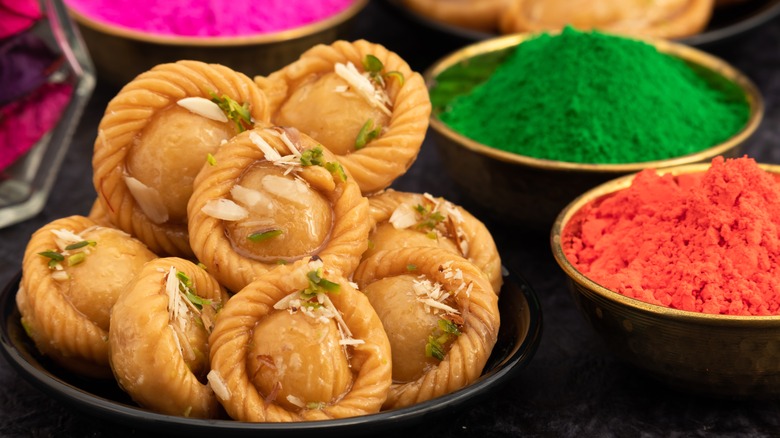As the well-known cookbook writer Nandini Iyer noted not long ago in ‘The Great Indian Thali: Seasonal Vegetarian Wholesomeness’, ‘gujiya’ is the “hallmark sweet” of Holi (she could have added Diwali, for it is the other big festive occasion when the sweet treat is much sought after).
She also said in an interview with BBC, because ‘gujiya’ is a “festive treat” eaten once in a while, you may be better off eating less of it than “rather trying to make it healthy”. A crescent-shaped, deep-fried pastry made with ‘suji’ and refined flour (‘maida’), kneaded with a generous quantity of ‘ghee’ to give it texture, filled with ‘khoya’ (milk solids), coconut shavings, assorted nuts and powdered sugar, and lightly drizzled with sugar syrup (‘chashni’), can a ‘gujiya’ ever be a healthy treat?
Yes, it can, if it is left to Arjita Kalra, who has been a part of the We The Chefs family since 2023. A champion of healthy eating, Arjita replaces the ‘khoya’ in a ‘gujiya’ with cashew flour and uses date sugar, or granulated dried dates, which is a low GI alternative to refined sugar and is good for even a person living with diabetes.
Another of our home chefs, Sarika Gupta, whose speciality is the cuisine of Purani Dilli, offers our customers the option of ordering in sugar syrup-free ‘kesar gujiya’. And Hemlata Mathur, whose forte is bringing the flavours of Rajasthan and Uttar Pradesh to our homes, is very popular for her ‘dahi gujiya’ drizzled with ‘saunth’ (whose base is a ginger-tamarind paste) and green chutney.

A ‘gujiya’ is called ‘pedakia’ in Bihar and Jharkhand, ‘pedaki’ in West Bengal, ‘ghugra’ in Gujarat and ‘karanji’ in Maharashtra, it is close to the sweet named ‘chandrakala’, which is round, whereas the ‘gujiya’ is crescent-shaped. Like its name, the ingredients that go into making a ‘gujiya’ also vary from one state to the other.
As food writer Rahul Verma points out in an article in ‘The Tribune’ newspaper: “The stuffing varies, too. Raisins, dry fruit, sesame or fennel seeds and cardamom powder add to the flavours of ‘suji’, ‘khoya’ and coconut. The ‘karanji’ of Maharashtra uses fresh coconut, which gives it a spurt of juiciness, and poppy seeds, which add to the texture of the filling.”

The origins of the ‘gujiya’ are shrouded in mystery. Certain historians have traced it back to a 13th-century reference to a sun-dried snack of jaggery and honey coated with wheat flour. Others have drawn parallels between the ‘gujiya’ and ‘baklava’, the famous Turkish puff pastry stuffed with nuts and sweetened with honey. These historians, perhaps influenced by its crescent shape, are of the view that the ‘gujiya’ was introduced to sweetmeat makers in India, or to the cooks in the Mughal kitchens, by Muslim traders from the Levant.
Some have pointed to the similarities between a ‘samosa’ and a ‘gujiya’, which, incidentally, is known as a ‘somasi’ in Tamil Nadu. A ‘gujiya’, according to this theory, is a logical extension of the ‘samosa’, being a sweet version of the savoury treat.
The ‘gujiya’ today is an inseparable part of Holi festivities in Bundelkhand (which is comprised of parts of Uttar Pradesh and Madhya Pradesh). In Bihar, though, its cousin, the ‘pedakia’, is associated with Hartalika Teej, which is going to be celebrated on August 26 this year.
So, how did the ‘gujiya’ become associated with Lord Krishna? It all started with the sweet being offered to the Lord at Vrindavan’s historic Radha Raman Temple, which was established in 1542 by the foremost disciple of the Vaishnava saint, Chaitanya Mahaprabhu, named Gopal Bhatta Goswami.
It is highly likely that ‘gujiya’ was a delicacy in Vrindavan in those days and therefore it made it to the offerings laid out daily for the Lord. And then, Holi is all about celebrating Radha and Krishna’s divine love. Today, Brij Ke Gujiya are famous all over the world, and Ram Sweets and Savouries as well as Brijwale are the two Vrindavan shops that have become famous over the decades for their ‘gujiya’ fried in aromatic ‘desi ghee’.
Call 8800988490 or drop an email at order@wethechefs.in to place your order of Gujias

